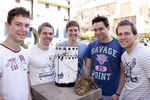Burning more than midnight oil
 Engineering Engineering
A group of engineering students are putting their skills to good use to potentially improve the health of Nepalese families and others across the developing world. Working with Engineers Without Borders, the final-year School of Mechanical Engineering students are designing a safe, efficient and cheap dung-burning cooking stove that reduces levels of harmful pollution. The stove is suitable for Nepalese conditions and adaptable for distribution throughout the developing world. The work by students Matthew Higgins, Josh Wilkey, Greg MacFarlane, Matthew Read and Tom West is being featured by Engineers Australia as part of the organisation's Make It So campaign for 2011, the Year of Humanitarian Engineering. They are supervised by Dr Paul Medwell and Dr Cristian Birzer. "Almost half the world cooks on an open, unventilated fire in their living space and relies on fuel like dung, wood and crop residues," Greg MacFarlane said. "These materials are typically burnt in simple stoves that produce incomplete combustion and high levels of harmful pollution. "Women and children particularly are exposed to high levels of smoke. According to the World Health Organization, poor combustion of cooking fires annually claims 1.5 million lives and claim the lives of more children under five than any other single cause, as well as 4% of the total global burden of disease." The students are using Top-Lit, Up-Draft (TLUD) technology for their stove prototypes, as opposed to the more conventional bottom-lit stove. The result, they believe, will be more efficient and complete combustion, with reduced emissions and stoves readily adaptable for dung and other waste fuel. Their stove prototypes are made from simple materials such as used product tins - cheap and readily available materials and easily maintained. "To date, the project has been challenging, rewarding and incredibly eye opening," said Greg. "In Australia we don't allow cigarette smoke in restaurants while almost half the world cooks on an open fire in their living room. Indoor air pollution produced by an unventilated fire can be up to 100 times higher than US legal limits. "This is an exciting project because simple technology exists today that can reduce harmful emission from cooking fires and improve the lives of billions of people. Our challenge is to use the right mix of technology and to make it accessible to those who need it." The project is coordinated by Engineers Without Borders as part of an initiative that connects local students and universities to partner organisations in developing countries, with the aim of applying technology to improve quality of life in disadvantaged areas. It is also supported by the International Young Professionals Foundation. For more information about studying Engineering, go to: ua.edu.au/degree-finder Story by Robyn Mills
|





